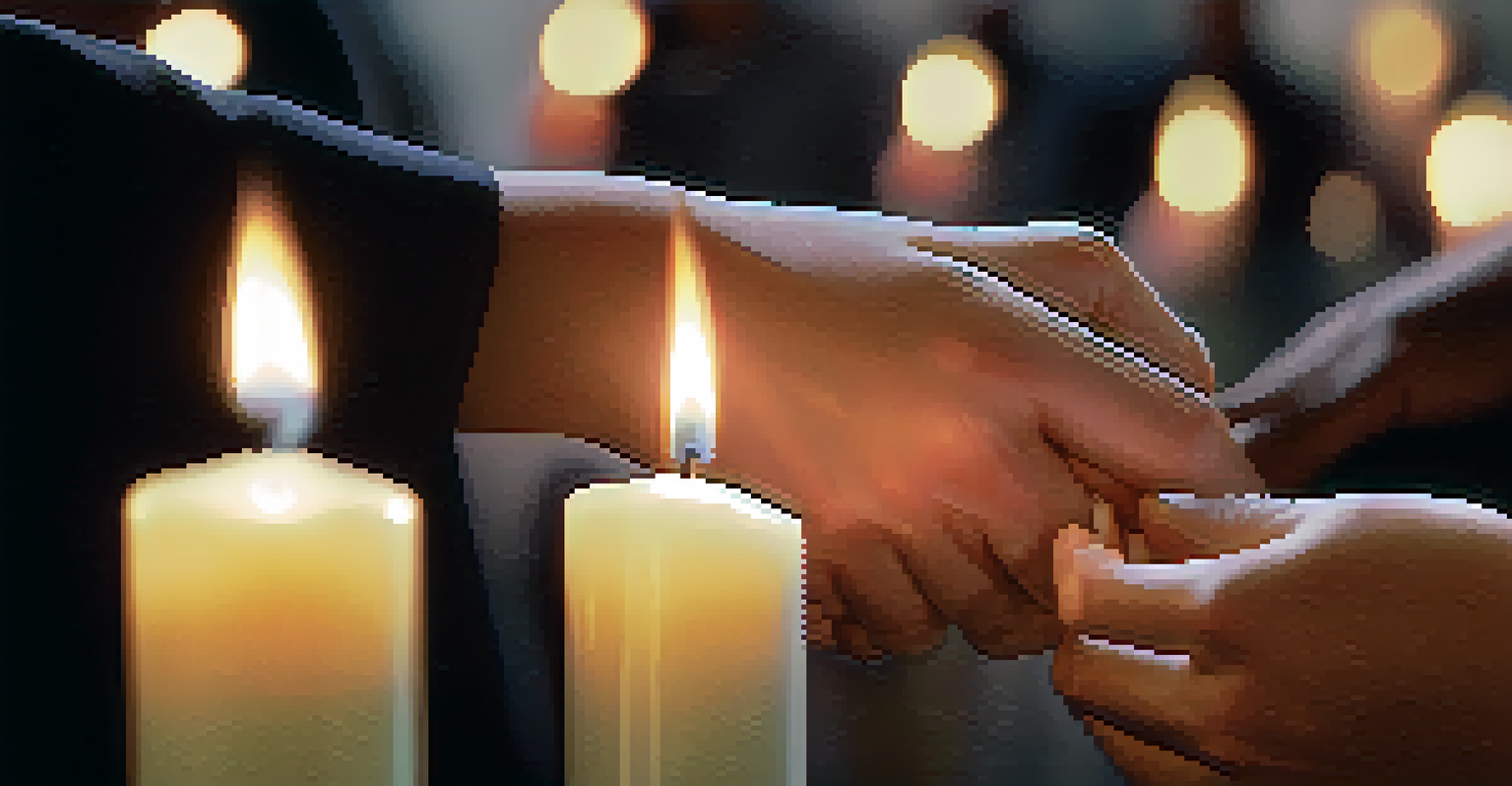The Role of Faith in Healing from Grief and Heartache

Understanding Grief and Its Impact on Our Lives
Grief is a universal experience, often arising from loss, whether it's the death of a loved one, the end of a relationship, or even a significant life change. It can feel overwhelming, manifesting in various emotions such as sadness, anger, and confusion. Understanding that grief is a natural response helps normalize the feelings that accompany it, paving the way for healing.
Grief is not a sign of weakness, nor a lack of faith. It is the price of love.
During grief, individuals may feel isolated, as if no one else can truly understand their pain. This sense of loneliness can deepen the heartache, making it difficult to move forward. However, recognizing that many people experience similar feelings can foster connection and support.
It's essential to acknowledge that grief doesn't have a set timeline. Everyone processes loss differently, and allowing yourself the grace to feel and heal at your own pace is crucial. This understanding can create a foundation for exploring how faith may play a role in your healing journey.
The Connection Between Faith and Healing
Faith often serves as a source of comfort during times of grief. It provides a framework for individuals to make sense of their pain and find hope amid despair. Many people turn to their faith communities for support, finding solace in shared beliefs and practices.

For some, faith can offer a sense of purpose, reminding them that there is a greater plan beyond their current suffering. This perspective can be incredibly empowering, helping individuals to view their grief as part of a larger narrative. It encourages them to find meaning in their loss, which is a vital step in the healing process.
Grief is a Unique Journey
Everyone processes grief differently, emphasizing the importance of individual healing timelines.
Moreover, faith can foster resilience, equipping individuals with the strength to face their emotions and challenges head-on. The rituals, prayers, or meditative practices associated with faith can provide a structured way to process grief and cultivate inner peace.
How Faith Provides Community Support During Grief
One of the most significant benefits of faith in the context of grief is the sense of community it fosters. Many religious or spiritual groups offer support networks that can help individuals feel less alone during their toughest times. These communities often provide opportunities for sharing stories, which can be incredibly therapeutic.
Faith is the bird that feels the light and sings when the dawn is still dark.
Support from others who share similar beliefs can help individuals feel validated in their grief. This shared understanding often allows for deeper connections, as members can empathize with one another's pain. These relationships can create a safe space for expressing emotions and finding comfort.
Additionally, community rituals, such as memorial services or prayer groups, can play a crucial role in the grieving process. They not only honor the memory of the lost but also bring people together, fostering healing through collective remembrance and support.
Finding Personal Strength Through Faith
Faith can help individuals tap into their inner strength during challenging times. Many find that their beliefs inspire them to persevere despite their grief. This newfound strength can manifest in various ways, such as engaging in self-care or seeking professional help when needed.
For some, faith can serve as a reminder that they are never truly alone. The belief that a higher power is watching over them can provide immense comfort, encouraging individuals to embrace their vulnerability while also finding courage. This duality can be a powerful motivator in the healing journey.
Faith Fosters Community Support
Faith provides a supportive network that helps individuals feel less isolated during their grief.
Moreover, personal reflection through faith can lead to profound insights about oneself and the nature of love and loss. Such revelations can help individuals grow, allowing them to emerge from grief with a renewed perspective on life and relationships.
The Role of Rituals in Healing Grief Through Faith
Rituals can be a powerful tool for healing, providing structure and a sense of continuity during turbulent times. Many faith practices include rituals that help individuals honor their loss, such as lighting candles, saying prayers, or participating in commemorative services. These acts can create a tangible connection to the deceased, making the grieving process feel more manageable.
Engaging in rituals can also serve as a way to express emotions, allowing individuals to channel their grief in a constructive manner. Whether it's through song, dance, or communal prayer, these expressions can foster a sense of release and relief. They remind us that grief is not just an inward journey but can also be shared outwardly.
Additionally, the regularity of rituals can provide comfort and stability. They can become a safe haven, offering a predictable space to process emotions and reflect on the loss. This can be especially important during times of uncertainty, providing a sense of control amidst the chaos of grief.
Embracing Hope and Moving Forward with Faith
While grief can feel all-consuming, faith can be a beacon of hope, guiding individuals toward healing and renewal. It encourages the belief that joy can coexist with sorrow, allowing individuals to envision a future where they can carry their loved one's memory without being weighed down by grief. This perspective is vital for emotional recovery.
Faith often emphasizes the importance of hope, teaching that there can be light after darkness. This principle can empower individuals to take small steps forward, building a life that honors their loss while also embracing new possibilities. It can inspire acts of kindness, service, or creativity as a way to celebrate the lives of those they've lost.
Rituals Aid in Grief Healing
Engaging in rituals associated with faith can create structure and help express emotions during the grieving process.
Ultimately, embracing hope through faith allows for growth and transformation. It can lead individuals to discover new passions or reconnect with old ones, helping them to redefine their identities in a way that integrates their experiences of loss while moving towards a brighter future.
Seeking Professional Help: A Complement to Faith
While faith can be a powerful ally in the healing process, it's important to recognize that seeking professional help can also play a vital role. Therapists, counselors, and support groups can offer tools and techniques to help individuals process their grief in a safe and structured environment. This can be especially beneficial when grief feels overwhelming.
In many cases, integrating faith with professional guidance can create a holistic approach to healing. For example, a therapist who respects and understands one's faith can help bridge the gap between emotional healing and spiritual support. This collaboration can provide a well-rounded framework for processing grief.

Ultimately, combining faith with professional help allows individuals to explore their feelings from multiple angles. It encourages them to embrace both their spiritual beliefs and psychological tools, creating a more comprehensive path toward healing and recovery.